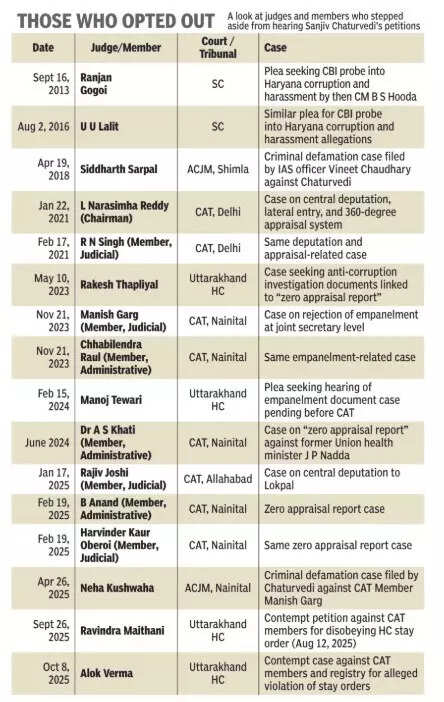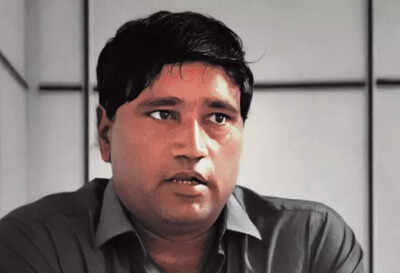Magsaysay winner Sanjiv Chaturvedi’s petitions are piling up at courts across the country. The whistleblower has fought cases alone, and even found Presidential support. So why are his battles being stalled?In a judicial system where recusals are rare and typically explained, 16 judges — across district courts, high courts and even Supreme Court — recused themselves from hearing one man’s cases, most without offering a reason. That man is Sanjiv Chaturvedi, a 2002-batch Indian Forest Service officer known not for fiery speeches or media attention but corruption reports so meticulously documented that they have prompted Presidential interventions. After nearly a decade of legal drift and avoidance, the chief justice of Uttarakhand high court has now, finally, agreed to hear all his pending cases himself.Chaturvedi walks into courtrooms alone. Sometimes, he argues his own cases, quietly quoting from case law. He avoids press interviews. He has no legal entourage. And yet, the names in his vigilance reports include senior bureaucrats, ministers, and institutional heads. What he lacks in theatre, he makes up for in records. But courtroom after courtroom has turned him away — not with judgment, but with absence.An electrical engineer from Motilal Nehru National Institute of Technology in Prayagraj, Chaturvedi became a public name not by choice, but by consequence. In Haryana, where he was first posted, he flagged illegal tree-felling, sand mining, and wildlife poaching — operations that, according to his findings, were protected by elements within the state’s bureaucracy and political leadership. He was transferred 12 times in five years. In 2007, he was suspended — an action later reversed by Presidential order in 2008.The Haryana govt filed a departmental chargesheet against him, accusing him of procedural lapses — charges he maintained were retaliatory. His complaint to the Centre led to the formation of a two-member inquiry committee. The panel reviewed the case and named then chief minister Bhupinder Singh Hooda and senior officials, holding them responsible for corruption, abuse of power, and targeted harassment of the officer. The committee concluded that the disciplinary charges were “baseless”, and recommended their annulment. It also advised that “action be considered against those who initiated them in bad faith”.In Jan 2011, the President accepted the committee’s recommendation and quashed the chargesheet. In Feb that year, the Haryana governor implemented the Presidential order, reversing Chaturvedi’s suspension and validating his actions. But in 2014, the same Congress-led Haryana govt filed a case seeking to quash both the inquiry report and the Presidential order — omitting the fact that its own governor had already implemented it. Chaturvedi filed his reply in 2016, which was taken on record by judge P B Bajanthri. In Feb 2018, the same judge fined him Rs 50,000, citing delay. A three-judge SC bench, led by the chief justice, waived the fine at first hearing. When Chaturvedi requested transfer of the matter to SC under Article 139A, citing similarity with other pending cases, SC left the issue to Punjab and Haryana high court.By then, Chaturvedi had been posted as chief vigilance officer at AIIMS, Delhi. Between 2012 and 2014, he initiated over 200 corruption inquiries — ranging from purchase scams to appointment irregularities. Among those named was Vineet Chawdhary, a 1982-batch Himachal Pradesh cadre IAS officer and former deputy director (admin) at AIIMS, who was later appointed chief secretary by the BJP govt in Himachal Pradesh.As CVO, Chaturvedi was authorised to report on the vigilance status of deputed officers. In Aug 2014, he sent a confidential letter to Himachal’s chief secretary about pending CBI and departmental cases against Chawdhary, based on investigations conducted under his watch. In 2016, Chawdhary filed a criminal defamation complaint. A trial court issued summons in 2018.

.
Section 197 of the Criminal Procedure Code protects govt servants from prosecution for official acts without sanction. Section 499 of the Indian Penal Code exempts official communication from defamation. Both provisions have been repeatedly upheld by SC and HC. However, when Chaturvedi approached Himachal Pradesh high court, chief justice Sanjay Karol refused to quash the proceedings. SC later observed that HC had failed to consider Chaturvedi’s submissions — but instead of halting the trial, it remanded the matter back to the same bench. The same HC had granted protection under section 197 CrPC in other cases, including to a top IPS officer.Citing threats to his life, Chaturvedi had requested a cadre transfer, which was approved in Aug 2015. Of course, new challenges awaited. In 2016, the Union health ministry gave him a ‘zero’ appraisal for the financial year 2015-16. He filed a writ in Uttarakhand HC. Then chief justice K M Joseph refused to admit the petition, citing a 1997 SC ruling (L Chandrakumar), which required service matters to be routed through tribunals. However, records show that Joseph had previously entertained — and soon after resumed hearing — similar petitions, including by IFS officers under investigation.Chaturvedi then approached the Central Administrative Tribunal, which stayed the appraisal report in Sept 2017. The stay remains in place as the central govt has not responded.Meanwhile, a new pattern emerged: judges began recusing themselves. Sixteen in total, across SC, HC and district courts. Some stepped aside after reading case files, others during initial hearings. Most gave no reason. Chaturvedi had no legal remedy to challenge this trend.“Recusals are meant to protect judicial impartiality. But here, they’ve become a wall,” said SC advocate Pramod Choudhary. Chaturvedi’s counsel Sudershan Goel cited SC rulings in R C Chandel (2012) and a 2019 verdict, both underscoring that judges are bound to decide cases based solely on facts and applicable law. “There is no precedent for this many recusals,” Goel said. “It amounts to a constitutional breakdown of judicial accountability.”Though courts have often turned him away, national institutions have recognised Chaturvedi’s work. He has delivered lectures on preventive vigilance at Sardar Vallabhbhai Patel National Police Academy and Lal Bahadur Shastri National Academy of Administration. He donated his entire Magsaysay award money to the Prime Minister’s Fund, gave Rs 2.5 lakh from an arbitration case to Pulwama victims, and redirected court costs in his favour to the PM’s National Relief Fund.He was 40 when he received the Ramon Magsaysay Award in 2015, making him one of the youngest Indian civil servants to win the honour — Kiran Bedi and T N Seshan were older. The citation praised his “exemplary integrity, courage and tenacity” in exposing corruption. His legal ability has also been recognised. A chief justice of Uttarakhand HC remarked that Chaturvedi argued “better than most counsel”.Now posted in Uttarakhand, he has shifted focus to conservation. He has led efforts to develop India’s first moss garden, forest healing centre, and pollinator park. In Corbett, he stopped unauthorised VIP safaris and fake tourism portals. In 2024, he submitted a 500-page report on an illegal tree-felling scam in Pithoragarh, recommending a CBI and ED probe.The cases he filed years ago continue to move slowly through the system. Judges still step aside. And he still walks in, alone, quoting law from memory, steadfast in his faith that truth will eventually triumph and he will be able to declare Satyameva Jayate. Go to Source


